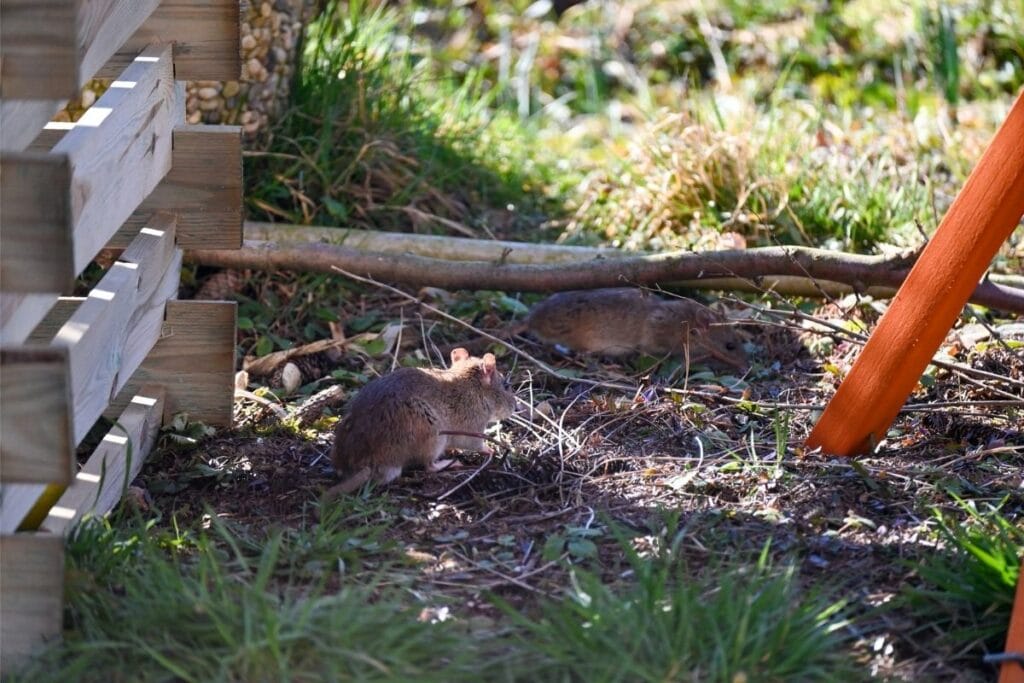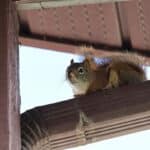Mice, rats or rodents can be a big problem for gardeners. They can eat your plants, fruits, and vegetables, or burrow through your soil and create problems with drainage.
In this blog post, we will share some tips on how to keep rats, mice and other rodents out of your garden. Because these animals are very similar in terms of their behaviors in your vegetable garden, the tips below will apply to all of them.
Keep reading to learn more!
Is it Normal to Have Mice in Your Garden?
In many parts of the world, having mice in your garden is considered to be a common and normal occurrence. At first glance, mice and rats seem like an unlikely ally when it comes to maintaining a well-kept garden.
After all, they can’t help with weeding or watering; in fact, they can actually do quite a bit of damage by digging up plant beds and munching on tender seedlings. So why would anyone want these garden pests hanging around?
The simple answer is that mice are highly skilled at looking out for themselves – and as a result, they have some valuable skills that are useful for any gardener. For example, these tiny creatures have extremely keen senses of smell and hearing.
This enables them to keep track of changes in seasonality and even detect gaps in your garden’s protective barriers. In other words, their ability to find weaknesses gives them an important role in the ecosystem of the garden – one that can actually benefit you as well as the mice!
So if you’re okay with sharing your garden space with these industrious little critters, then don’t panic the next time you see a few mouse droppings among your plants – just roll up your sleeves and let nature take its course!
That said, mice offer their fair share of disadvantages, too. If you have more than a few hanging out in your garden, you’ll want to take action.
Mice are notorious pests, and they can cause a lot of problems in the garden. Not only do they tend to ravage seedlings and eat fruits and vegetables, but they also carry a number of diseases that can infect plants.
How to Tell if You Have Mice in Your Garden
When it comes to discerning whether or not you have mice in your garden, there are a few telltale signs to look out for.
First and foremost, mice are known to eat the seeds and bulbs of many common garden plants, including tomatoes and strawberries.
Because they feed mainly on plant matter, their droppings will often be small and cylindrical, like little pellets or grains of rice.
Additionally, mice favor cool, dark places to nest and lay their young, making them likely candidates for burrowing under mulch or other loose materials in shady areas of your garden.
To confirm that you do indeed have a rat infestation in your garden, look closely through these materials to try and catch sight of the tiny animals scurrying away from you.
Finally, if you hear squeaking sounds coming from your garden at night or find small rat burrows in the soil surface where roots used to be, there is a good chance that you have discovered the culprits behind any damage done to your precious plants.
Where Do Mice Hang Out in the Garden?
Mice are crafty little creatures that are always on the lookout for a warm, safe place to build their nests. Unfortunately, this often means invading people’s homes and gardens. If you’re dealing with a mouse problem, it’s important to know where they like to hide so you can take steps to deter them.
One of the most common places you’ll find mice is in your garden shed or garage. These areas provide plenty of hiding places and access to food and water.
Mice will also build their nests in piles of wood or leaves – or even in the compost piles – so be sure to keep these areas clean and free of debris. Another popular hiding spot for mice is under decks or porches. These areas are often dark and secluded, making them ideal for nesting.
If you have a deck or porch, be sure to check for signs of mouse activity, such as droppings or gnawed holes in the lumber.
Mice are resilient creatures that can squeeze into surprisingly small spaces. This means that they can pretty much nest anywhere on your property if given the chance. By being aware of their favorite hiding spots, you can take steps to deter them from setting up camp in your garden or home.
Stop Rats Eating Your Veggie Garden
Rats and mice are cute little creatures that many people enjoy having around, but they can also be a nuisance. One of the main complaints about mice is that they will eat just about anything, including garden plants.
While it is true that mice are not picky eaters, there are actually only a few types of plants that they are attracted to. Some of the most common plants that mice like to eat include lettuce, spinach, and cabbage. Mice also enjoy eating fruits and vegetables such as apples and tomatoes.
In general, if a plant is soft and easy to nibble on, chances are good that mice will be interested in it.
Fortunately, there are a few simple ways to deter rats and rodents from your garden. Keep reading to learn more.
How to Keep Rodents Out of Garden
Mice can be a common problem for gardeners, especially during the colder months when they are looking for a warm place to stay. If you have mice in your garden, there are several things you can do to get rid of them.
Here are some tips on how to get rid of rats and rodents in your garden.
Watch When You’re Feeding Your Pets
When you’re feeding your pets, it’s important to be mindful of where the food ends up. If you’re not careful, you may end up attracting mice to your garden.
Mice are attracted to the smells of pet food, and they will often rummage through the garbage in search of a meal.
Store pet food in sealed containers, and keep garbage cans securely lidded. Remove pet food dishes when your pets are finished eating. By taking these simple precautions, you can help to keep your garden mouse-free.
Move Bird Feeders
One way to deter mice is to keep bird feeders away from the garden. Mice are attracted to the high concentration of seeds in bird feeders, and they will often travel long distances to find a source of food.
By keeping bird feeders away from the garden, you can help to prevent mice from finding their way into your plants.
Don’t let bird seed fall out of your feeder; it can also attract rats. Additionally, it’s important to keep your garden clean and free of debris.
Properly dispose of food scraps, such as fruit peels or discarded vegetables, as well as any green and brown materials that might accumulate in your garden.
Repair Hoses and Spigots
One way to deter mice from making your garden their home is to repair any leaks in hoses or spigots. Mice are attracted to water, and a leaky hose or spigot can provide them with the moisture they need. By fixing these leaks, you can help to keep mice away from your plants.
Store Seeds Indoors
Before you head out to the garden to plant, you may want to consider storing your seeds indoors.
Mice are attracted to the warmth and shelter of gardens in the winter, and they can quickly decimate a seed cache. By keeping your seeds stored indoors, you can prevent them from becoming a tasty snack for mice.
When it comes time to plant, simply sow the seeds directly in the ground. This will help to ensure that your plants get a good start and are not damaged by hungry rodents.
Avoid Fluffy Mulch
When thinking about mulching our gardens, many of us are focused on the benefits of keeping moisture in and weeds out.
But while fluffy mulch may seem like a great choice, it can actually lead to an unwanted pest problem: mice. When applied too loosely or too thickly, fluffy mulch can create cozy little nests for these tiny critters, providing them with food, water, and shelter all in one place.
To help protect your garden from invasive mice, it is important to choose a high-quality, finely-textured mulch that will cover the ground without creating any potential nesting areas. With this type of mulch in place, you can be sure that your garden beds will stay free from pesky mice and allow your plants to thrive.
Reduce Nesting Sites
One way to prevent mice from taking up residence in your garden is to reduce potential nesting sites. Keep piles of mulch, debris, and wood piles far away from your plants, and trim back any overgrown areas where mice might find shelter.
Cut Overgrown Vegetation
One of the most effective methods to keep mice out of the garden is to keep vegetation trimmed. Mice like to nest in overgrown areas, so cutting back on the amount of vegetation provides them with fewer places to hide.
Additionally, mice are attracted to the smells of certain plants, so removing strong-smelling vegetation can also help to deter them.
Mow the Lawn Regularly
Regular mowing of the lawn is essential for discouraging mice from taking up residence in your garden. Mice are attracted to areas where vegetation grows unchecked, so keeping your grass short and neat will help to discourage them from setting up shop in your garden.
Maintaining a well-trimmed lawn will reduce the amount of shelter available to mice, making it harder for them to hide from predators or seek cover while they search for food.
Grow Mice-Repelling Plants
There are a number of plants that can help to repel mice. Some of the most effective include catnip, mint, and garlic. These plants produce strong scents that mice find offensive, and they will generally avoid areas where these plants are growing.
In addition to planting these repellents around the perimeter of your home, you can also place them in areas where mice are known to nest or enter.
This will help to keep them away from your food and possessions, and it may also discourage them from returning in the future. If you’re looking for an effective way to keep mice out of your home, consider using some of these mouse repelling plants.
Improve Sanitation
Maintaining a clean and pest-free garden is essential for keeping mice out. To start, it’s important to clear away any debris and groundcover that may be harboring mice or other pests.
This includes clipping overhanging vegetation and removing weeds that provide shelter or food sources for rodents. In addition, maintaining a tidy garden also means taking care of the soil and plants themselves.
Consider adding fresh mulch and applying regular doses of fertilizer or compost heaps to help keep the soil healthy and plants strong.
Seal Fence Holes
One often-overlooked strategy for preventing mice (and their larger cousins, rats) from sneaking into your garden is a combination of plugging up any holes or gaps in the fence that surrounds your yard and installing fencing to keep rats out of gardens.
Mice can easily find their way through tiny cracks and crevices, so it is important to seal any openings that might exist along the lengths of your fence. This can be done using a number of different materials, including caulk, spray foam, plaster, or even steel wool.
Once these holes are sealed up, you can rest easy knowing that squirmy little critters won’t be able to sneak into your yard and feast on your seedlings.
Put Mesh Tubes Around Seedlings
One way to keep mice out of your yard is to put mesh tubes around the seedlings. The mesh will keep the mice from being able to reach the seedlings, and it will also give the seedlings some protection from the elements. Plus, it’s an easy way to keep your garden looking tidy.
Control Lawn Grubs
When it comes to protecting your lawn from pests, there is one particular threat that can be especially problematic: grubs.
These larval insects feed on the root system of grasses, leaving them vulnerable to other types of damage such as that caused by mice. Fortunately, there are several effective strategies for controlling grubs and safeguarding your lawn from further damage.
One strategy is to enlist the help of naturally occurring predators like lizards, birds, and toads. These animals will happily eat any small invertebrates they locate, including grubs and their eggs. Alternatively, you can attack the problem directly by using a soil treatment or insecticide designed to target these hard-to-control rats.
For effective rodent control, consider implementing these measures to keep your lawn healthy and free from unwanted pests.
Get a Cat
If you want to keep those pesky rats out of your garden, the best thing to do is get yourself a cat. Cats are natural predators of mice, so by letting one roam around your garden, you will create a safe and hostile environment for these rodents.
Another benefit of having a cat in your garden is that it will also help to keep unwanted insects at bay.
Use Dryer Sheets
Dryer sheets emit a strong scent that mice find offensive, and placing them around the perimeter of your garden will help to keep them away. You can also place dryer sheets inside flowerpots and garden sheds to deter mice from taking up residence there.
Try Irish Spring Soap
Looking for an inexpensive and effective way to keep rodents out of your yard? Try using Irish Spring soap! Simply place a bar or two of soap near areas where you’ve seen mice activity, and they should stay away. The strong scent of the soap is unpleasant for mice, and they’ll avoid it if they can.
Use Mouse Traps
One effective way to tackle the problem is with mouse traps, which use a combination of bait and deadly force to stop mice in their tracks. These traps are particularly well suited for gardens, as they can help to safeguard your plants against nibbling pests and keep invasive weeds from taking root.
What Scent Will Keep Mice Away?
Mice are notoriously shy creatures, and they will quickly flee from an area that smells unpleasant to them. As such, a number of different scents can be used to deter mice, including peppermint, lemon, and citrus.
In addition, you can also make your own mouse repellent by mixing these essential oils with water and spraying it around the perimeter of your garden.
Make Sure Mice Don’t Get Into Your Home
By being proactive and taking these simple steps, you can effectively keep the damaging rodents out of your garden and out of your life. Most importantly, make sure you don’t present mice with any opportunity to migrate from the garden into your home!
If you’re having a problem with mice in your garden, there are some things you can do to try and keep them out.
One of the best ways to deter mice is by using a natural repellent. There are several different types of repellents available, so find one that works best for you and your garden. You can also try placing barriers around your plants, such as wire mesh or chicken wire.
Additionally, be vigilant about cleaning up any food or water sources that may be attracting the mice in the first place. By following these tips, you can prevent rodent infestation and keep those pesky little critters away from your garden!
Also check our guide on how to get rid of ground moles and other animals out of your garden.
FAQs
What scent will keep rats away?
Rats are repelled by strong, pungent odors such as peppermint, citronella, eucalyptus, and ammonia. These scents can be used as natural rat deterrents by placing cotton balls soaked in essential oils or ammonia in areas where rats are present.
What smell kills rats instantly?
There isn’t a specific smell that kills rats instantly, certain odors can repel or deter them.
What sound makes rats go away?
Ultrasonic sound devices are often marketed as a deterrent for rats and other rodents. These devices emit high-frequency sound waves that are intended to be unpleasant for rats, causing them to leave the area. However, the effectiveness of ultrasonic devices in repelling rats is debated, and results may vary depending on factors such as the environment and the behavior of the rats.
What’s the best animal to get rid of rats?
Cats are often considered effective natural predators of rats and can help keep rat populations in check. Some dog breeds, such as terriers, are also skilled hunters and may help deter rats. However, it’s essential to note that relying solely on pets to control rat populations may not always be sufficient, and additional measures may be necessary for effective rat management.
*image by FotoEvans/depositphotos







